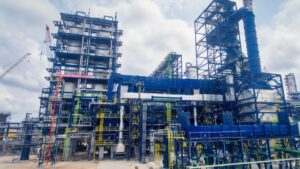
1,029MW stranded due to gas shortage, unpaid invoices
Eight of the power plants on the national grid suffered gas constraints on Wednesday amid concerns by gas producers over unpaid invoices in the Nigerian electricity supply industry.
A total of 1,029.80 megawatts of generation capacity was idle as of 6am on Wednesday as a result of gas constraints.
The nation’s total unutilised electricity generation capacity stood at 2,119.8MW as of 6am on Monday, with low load demand by the distribution companies and water management stalling the generation of 1,090MW.
The power plants affected by gas constraints included Omotosho I, Olorunsogo I, Omoku, Afam VI, and Geregu II (NIPP).
Others were Omotosho II (NIPP), Gbarain NIPP and Trans-Amadi, according to data obtained from the Nigerian Electricity System Operator.
Total power generation in the country stood at 4,775.8MW as of 6am on Wednesday, compared to 4,751.8MW on Tuesday.
The Oil Producers Trade Section, comprising international and local operators in the Nigerian oil and gas industry, decried last Thursday the unpaid gas invoices in the power sector.
In its presentation at the international conference of the Nigeria Gas Association, the OPTS said, “We must of a necessity repay all outstanding gas invoice arrears. Some companies are being owed as far back as 2015-2016. This is not sustainable; we must be able to get assurance that when we produce the gas, we will get paid for it.
“So, we must of a necessity quickly settle all outstanding debts and make sure that we establish bankable credit support that will make the gas business to grow so that investors can develop more gas resources.”
The nation generates most of its electricity from gas-fired power plants, while output from hydropower plants makes up about 30 per cent of the total generation.
The Minister of Power, Saleh Mamman, said last Friday that the administration of the President, Major General Muhammadu Buhari (retd.), was committed to the nation’s electrification strategy to avail Nigerians reliable, sustainable and affordable power.
He said at the introduction of the Ashama 200MW Solar Farm project in Lagos that the Federal Government had launched Vision 30:30:30, a target to deliver 30GW of electricity with 30 per cent renewable energy by 2030.
Mamman said, “The objective of our off-grid policy is to attract investment into the off-grid arena. Today’s event serves as feedback to our strategy.
“The Ashama 200MW Solar Farm, when completed, will serve as the biggest utility solar project not only in the country but the West African region.”
Saleh said the ministry had developed five focus areas to serve as a roadmap to support the national policy directive.



